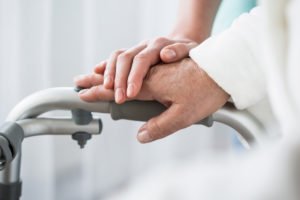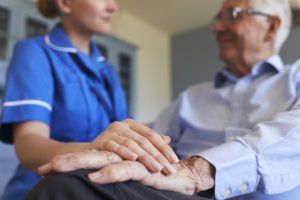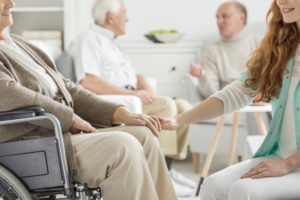
Abuse and neglect in a nursing home setting should never happen. Our elderly citizens should be able to live out their final years with the care, dignity, and respect that they deserve. Unfortunately, some nursing homes put profit above their residents’ well-being. Nursing home abuse and neglect happen more frequently than we might think.
According to the Centers for Disease Control and Prevention (CDC), 1.3 million vulnerable nursing home residents face the risk of nursing home abuse every day.
Nursing home abuse is illegal. If your relative is the victim of nursing home abuse, you might want to consult with a Boston nursing home abuse lawyer. You can potentially hold the nursing home responsible and could recover compensation for their injuries. Call Ben Crump Law, PLLC, today at 800-959-1444 for a free evaluation of your case with a team member.
Types of Nursing Home Abuse
You might find some types of nursing home abuse easier to spot than others. According to the National Center on Elder Abuse (NCEA), the forms of elder abuse that could occur in a nursing home include:
- Physical abuse
- Sexual abuse
- Emotional abuse
- Neglect
- Financial exploitation
While nursing home residents suffer injuries from each form of elder abuse, you can usually detect the signs and symptoms of physical abuse more easily than those of verbal or emotional abuse.
For a free legal consultation with a nursing home abuse lawyer serving Boston, call 800-712-9119
Signs of Nursing Home Abuse to Watch For
Even if some nursing home abuse or neglect incidents might be challenging to detect, you can watch for any of the following signs or symptoms of elder abuse.
Physical Abuse
Physical abuse is the use of force to harm another person. It can include acts such as hitting, kicking, and shoving the older person. Inappropriate restraint is also a form of nursing home abuse.
Your loved one might tell you about incidents of physical abuse. However, even if they are nonverbal or too ashamed to say anything, physical abuse is relatively easy to detect. It typically causes injuries on a nursing home resident’s body, such as:
- Bruises
- Lacerations
- Cuts
- Burns
- Broken bones
- Internal injuries
Sexual Abuse
Sexual abuse includes any unwanted sexual contact, including with residents who are incapable of giving consent. Sexual abuse is not only rape but can consist of any unwanted displays of nudity, sexual photographs, or videos of a sexual nature. Signs of sexual abuse include:
- Bruising or bleeding in the genital area
- Unexplained sexually transmitted diseases
- Torn or bloody underwear
Emotional Abuse
Emotional abuse can be difficult to detect in the nursing home unless your loved one tells you when someone has abused them. Emotional abuse can include verbal attacks such as humiliating or belittling a resident, refusing requests, threatening them, or socially isolating the resident. An unusual change of character in the abused resident can sometimes be the only sign that not all is well. These changes can include:
- Agitation
- Withdrawal from social contacts
- Depression
- Unusual behaviors such as sucking thumbs or rocking oneself
- Fear of certain caregivers
Neglect
Neglect can happen when the nursing home does not have enough employees to fulfill residents’ daily needs adequately. Neglect can include failing to help residents with eating and drinking, not helping with the personal hygiene of residents, making medication errors, failing to administer medicines, and allowing unsanitary living conditions to fester. Some signs of neglect in the nursing home can include:
- Unexplained rapid weight loss
- Dehydration and malnutrition
- Bedsores
- Dirty clothes
- Unkempt appearance
- Worsening health conditions
Financial Exploitation
Financial exploitation is also a form of elder abuse and can include theft as well as coercing the older person into making monetary gifts. It can also include improperly using a power of attorney for financial gain. Signs of financial abuse include:
- Bills remaining unpaid
- Sudden changes in the resident’s will
- Unexplained bank transfers of large amounts
- The disappearance of funds or valuables
If you suspect or have evidence of your loved one suffering from abuse in their nursing home, you do not just have to accept it. The law is on your side, and you could have legal recourse if you can prove that your loved one suffered from abuse. You can speak to a Boston nursing home abuse lawyer to find out about your options. Call Ben Crump Law, PLLC, today for a free case review with a team member.
Boston Nursing Home Abuse Lawyer Near Me 800-712-9119
You Do Not Have to Accept Nursing Home Abuse
Nursing home abuse is an egregious crime, and if it happened to your relative, you should act today. The Nursing Home Reform Act (42 U.S. Code § 1395i-3) from 1987 codified that nursing home residents have a right to be free from abuse and neglect. You can potentially hold a nursing home to account for your loved one’s injuries, medical costs, and other damages.
You can demonstrate the negligence of the nursing home in the following ways:
- The facility does not have enough staff to care for all residents adequately.
- A lack of staff training on best practices.
- Staff members lack the necessary qualifications.
If you have witnessed your loved one’s abuse, you can take some steps that could later help you when considering holding the nursing home accountable.
Collect Evidence As Soon As Possible
Evidence can include any photographs of injuries or unhygienic surroundings, financial statements, medical records, and witness statements. Make sure that you collect all bills and receipts for any medical costs in connection with the abuse injuries, as well as other expenses related to the abuse (for example, moving costs to another facility).
Click to contact our Boston Personal Injury Lawyers today
Ben Crump Law, PLLC Can Help You
You might struggle to prove the negligence of a nursing home. Expect nursing home administrators to fight back with their team of lawyers. However, you do not have to face them alone. A Boston nursing home abuse lawyer can help hold those responsible to account.
While seeking justice in court cannot turn back time, it can go a long way to making your loved one whole again and compensating them for their pain and suffering. If you let the nursing home get away with abuse, the perpetrators will most likely subject other innocent elderly residents to egregious and criminal acts.
A nursing home abuse lawyer can help you pursue justice and compensation for your loved one’s suffering. Contact Ben Crump Law, PLLC, today at 800-959-1444 for a free case review with a team member.
Call or text 800-712-9119 or complete a Free Case Evaluation form








